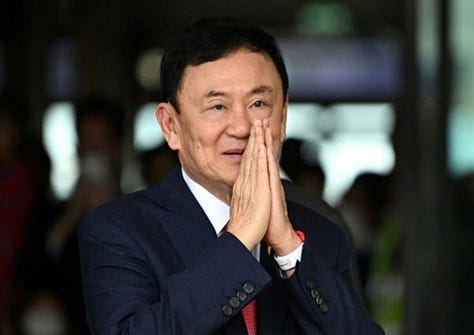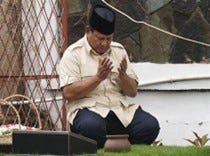


Among Christians like myself educated in a strong Roman Catholic tradition, the Biblical parable of the prodigal son remains in the imaginary of many Catholics.
Luke, one of Jesus' twelve disciples, recorded the story in The New Testament of two sons, one of whom left the family home to live a life of recklessness in a faraway country and squandered his inheritance. The older son dutifully stayed home and tended to his filial duties.
The prodigal son returned home to his father when he consumed his riches and lived a life of misery. He took on work to feed the pigs. Back home, his father's servants had more than enough bread while he perished with hunger. His father rejoiced at his return, put a robe on him, a ring on his hand, shoes on his feet, and slaughtered a calf. His lost son had resurfaced and was rewarded. His other son bristled with anger and resentment at not being recognized for his loyalty and obedience.
The story of the returning son is a pervasive theme in politics these days. Like the Biblical parable, three leaders from Southeast Asia have returned from exile. Not just to rejoin a flourishing household but to return to politics at the highest levels. A political comeback that heralds a changed political landscape for the Philippines, Thailand, and Indonesia was the immediate consequence of their return.
First, Ferdinand "Bong Bong" Marcos, Jr., son of strongman Ferdinand Sr., who was ousted in 1986 through a peaceful power revolution in the Philippines. At 28, Bong Bong went into exile. He and his family left in an unceremonious exit for an unglamorous arrival in Hawaii.
Last year at the World Economic Forum, he referred to those years as "a very trying time" and "dark days for the family." Bong Bong returned to power and reoccupied Malacanang Palace, the presidential grounds from where his family fled decades ago in the thick of night aboard American helicopters.
His was a stunning return: a landslide victory during the 2022 presidential elections. He garnered nearly 60% of all eligible votes cast, an electoral outcome that gave Bong Bong an undeniable mandate and a definitive return of the Marcos family to political prominence.
Then followed former Thai prime minister Thaksin Shinawatra, who was self-exiled for 15 years following a coup in 2006 that deposed him while he was at the United Nations in New York. He landed in August 2023 in the early morning at Bangkok's Don Mueang Airport, just hours before the parliamentary vote would be cast to install Srettha Thaivisin as prime minister. A property tycoon, Thaivisin heads the Pheu Thai Party, the latest incarnation of Thaksin's political movement. A coalition of several parties installed Thaivisin into power, preventing Pita Limjaroenrat, head of the Move Forward Party and winner of the popular elections in May, from becoming Thailand's head of government.
Thaksin was arrested on arrival at Don Mueang Airport and sentenced to eight years in prison on charges of corruption and abuse of authority. A royal pardon reduced his sentence to a year. His poor health and age made him eligible for an early release. Instead of going to the Bangkok Remand Prison, he went to the Police General Hospital and served six months under hospital supervision.
On an early dark February morning after six months under hospital arrest, Thaksin left the Police General Hospital.
Prime Minister Thaivisin declared, "he has already served his jail time," even though Thaksin did not spend a day in prison. Thaksin was granted parole. Outside his home, hundreds of supporters greeted his return, much like the rejoicing household of the prodigal son. But none of them offered Thaksin a fattened calf or dancing servants.
The most recent prodigal son to return to the political scene is Prabowo Subianto, the newly-elected president of Indonesia. On 14 February, Prabowo garnered 58% of votes cast, awarding him a convincing majority and a decisive single-round win, sparing him a run-off against one of his two opponents, former Jakarta governor Anies Baswedan and former Central Java governor Ganjar Pranowo who respectively garnered 25% and 17% of the votes.
Like Marcos and Thaksin, Prabowo was no stranger to exile. He returned from Jordan in 2008, having gone into self-exile in the late 1990s during the dying days of President Suharto, who was ousted in a popular uprising similar to the Philippine experience that removed Bong Bong Marcos' father from power.
Prabowo served as a special forces general in Suharto’s government. Accused of torture of democracy activists, committing atrocities in East Timor and Papua, and instigating anti-Chinese race riots in Jakarta in Suharto's final days, Prabowo was fired.
Upon his return to Indonesia, Prabowo made his fortune in the palm oil, coal and gas, mining, agriculture, and fishery industries, which provided him a base for a return to politics.
Savvy media campaigns helped Bong Bong and Prabowo, both of whom employed plenty of gimmicks to return to power, according to Foreign Policy columnist James Crabtree.
Lacking the charisma of both his father and his predecessor Rodrigo Duterte, Bong Bong relied on social media and sidelined the mainstream press. He avoided journalists and refused to participate in debates. BBC correspondent Jonathan Head reported that Bong Bong's campaign uploaded "deceptively-edited video on YouTube, which were then reposted on sympathetic Facebook pages."
Bong Bong campaigned on a counter-narrative about the alleged golden age of Marcos Sr, who built roads, bridges, hospitals, and a nuclear power plant. It was a tale that appealed to a country that had grown weary of years of political polarization and pandemic hardship and yearned for a better future. The myth-making worked, and voters lapped it up. Political scientist Aries Arugay deemed the disinformation campaign "top-notch."
On the other hand, Thaksin coalesced with the conservative forces to thwart the rise of the Move Forward Party led by the charismatic Pita Limjaroenrat. Political observers noted that a deal may have been struck to allow Thaksin to return home and create a window of opportunity for his Pheu Thai Party to take the reins of government.
Thitinan Pongsudhirak, Senior Fellow at the Institute of Security and International Studies at Chulalongkorn University, believes that Thai politics have "moved beyond Thaksin. It's no longer about Thaksin populism in Thailand; it's about institutional reforms of the royal establishment that the Move Forward Party is proposing." In brief, Thaksin's return was not a redemptive act but a political calculation of his party's waning popularity and a cynical ploy to remain in power.
The return of Southeast Asia's prodigal sons to the peak of political life provides instructive lessons and defies naïve notions of redemption.
First, rebranding is not redeeming.
Vergel Santos was a journalist during Marcos Sr.'s regime and now is a board member of the Center for Media Freedom and Responsibility. He views Bong Bong's agenda as "vanquish[ing] the remaining memories of his father's draconian regime, his torture, murder and plunder."
Likewise, Prabowo, who ran three times before becoming president, reworked his image on TikTok as a cuddly grandfather, a benign politician who appeals to the younger generation that makes up the majority of Indonesian voters, many of whom have no memories of the dictatorial regime of Suharto.
Remembrance of things past is not necessarily the remembrance of things as they were," a gentle reminder from the philosopher Marcel Proust.
Second, neither is political accommodation redemption.
The Thaksin formula of conniving with the conservative establishment to thwart the more progressive Move Forward Party is a clever maneuver. Speculations are rife that incumbent Prime Minister Srettha is merely "filling in" for Paetongtarn Shinawatra, Thaksin's daughter, until she learns the ropes and acquires the political finesse needed to handle the top job. A recent Bangkok Post headline read: Srettha Should Beware!
Prabowo owes his victory to Indonesia's hugely popular incumbent president, Jokowi Widodo. However, Jokowi's endorsement came at a price: his son Gibran Rakabuming Raka became Prabowo's running mate after the constitutional court lifted the age limit and allowed the 36-year-old candidate to run for the vice presidency.
The alliance with Gibran transferred some of Jokowi's support base to Prabowo, much like the alliance between Duterte and Marcos in the May 2022 Philippine elections, which consolidated the voting blocs of the solid North and the solid South. The BBC's Jonathan Head warned that this Faustian arrangement can fall apart for Prabowo and Gibran as it already has for Bong Bong Marcos and Sara Duterte.
The final lesson: Play the long game.
The three prodigal sons did not suddenly show up at the airport, contrite and remorseful like the Biblical prodigal son. Instead, each one of them maintained their presence and strove for relevance for decades.
Bong Bong Marcos returned in 1991 and subsequently ran for several local and national positions: as governor of Ilocos Norte, as senator of the republic, and as vice-president. His sister Imee also remained active in politics and is an imcumbent senator. Not to be outdone, matriarch Imelda Marcos ran for the presidency in 1992 (she lost!) and again for a congressional seat in 1995.
Prabowo ran against Jokowi twice, in 2014 and 2019. Not giving up, he tried again in 2024.
Finally, Thaksin might have been in exile for over a decade. But his political party, Pheu Thai, continued to vie for political office. In the 2019 general elections, Pheu Thai won the majority of seats but was prevented from forming a government. Populist policies combined with an extensive network of local power-brokers has made Pheu Thai the party of choice and the party of endurance. Doggedness pays.
The real returnee will be Pita Limjaroenrat of the Move Forward Party, who would have been Thailand's prime minister had he not been thwarted by the 250 military-controlled senators that denied him the numbers to form a government.
After a six-month hiatus when he was temporarily suspended for allegedly violating election rules, Pita returned to Parliament at the end of January to a roaring hero's welcome.
Unlike the prodigal sons, Pita does not harbor a dark past. Instead, he is the face of the future of Thai politics. He has time, energy and a progressive democratic agenda that resonates with Thai youth, first-time voters in 2023 who delivered 4 million votes for his party. Becoming prime minister is the long-awaited return for Pita. And he is nobody’s prodigal son.



